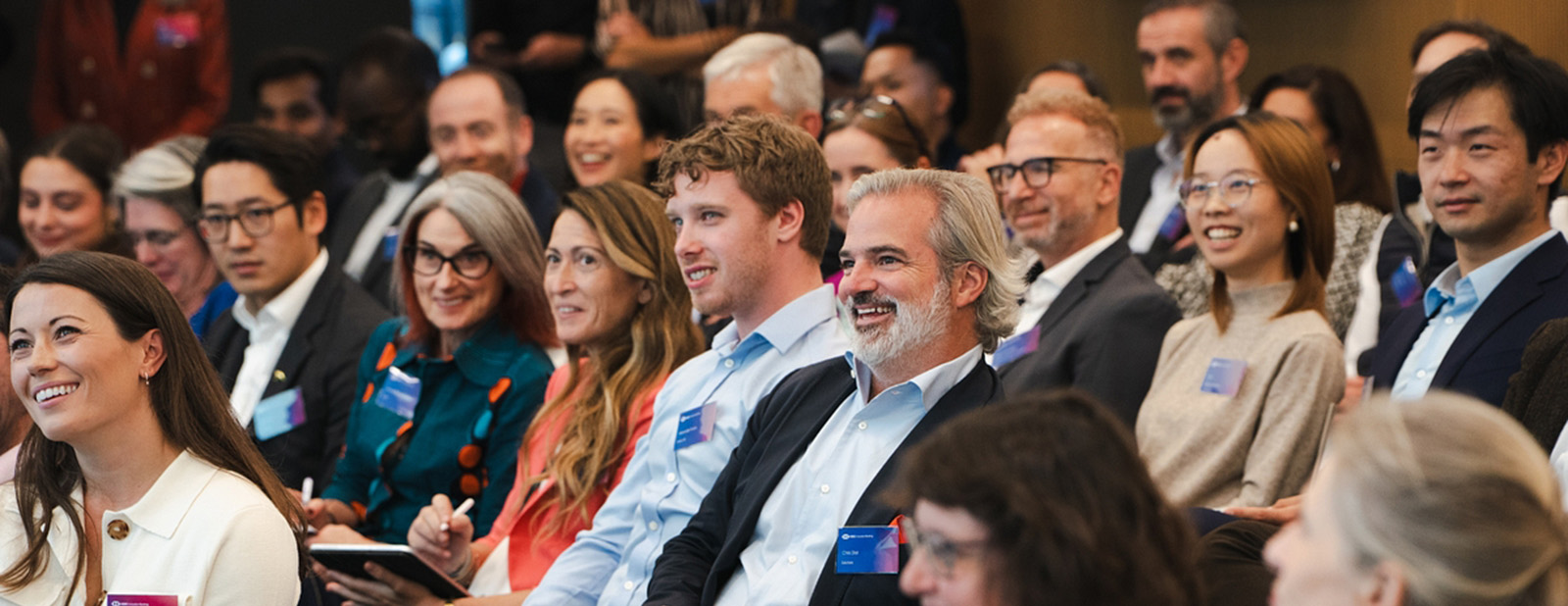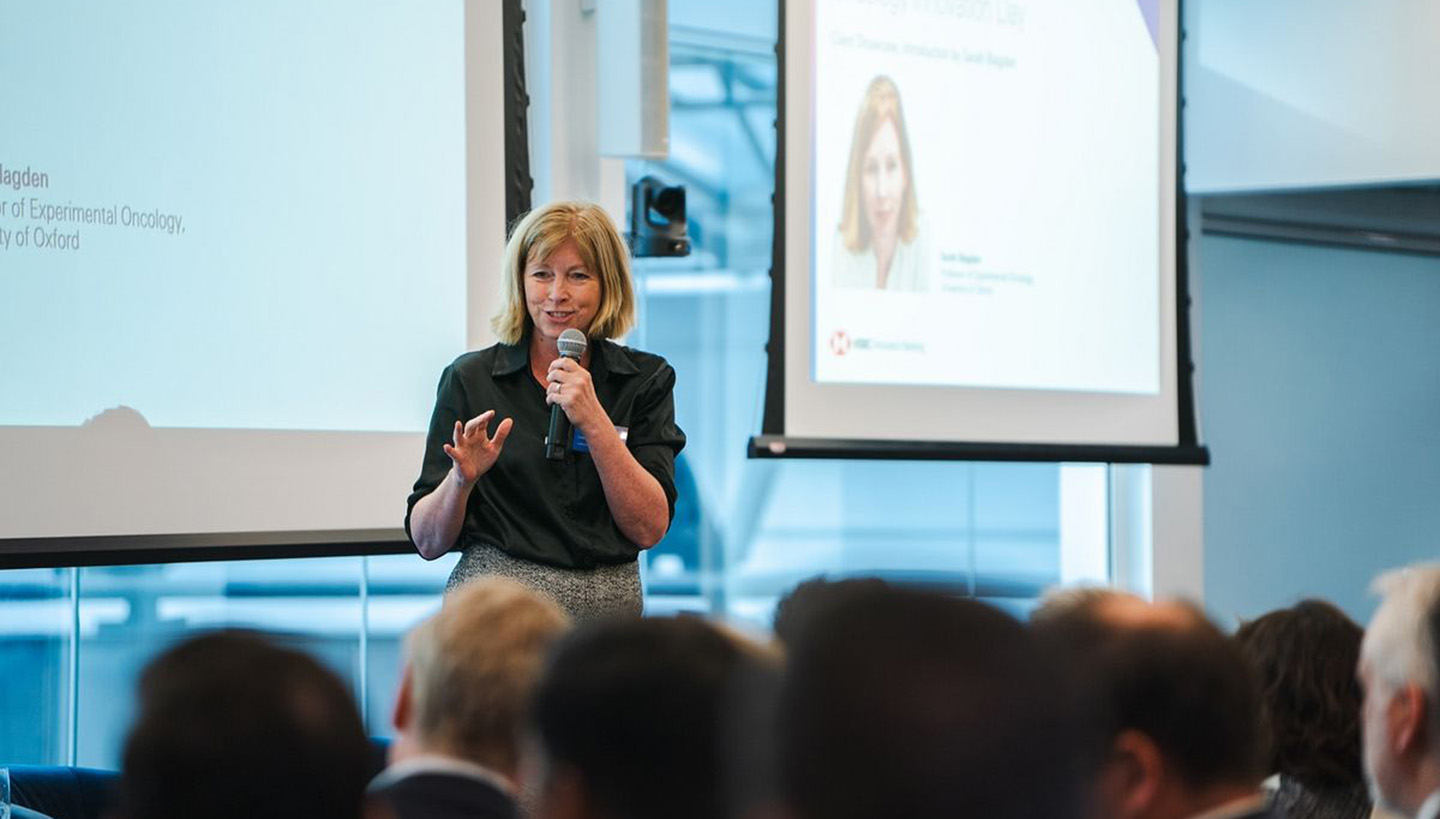From pitches and panels to patients and passion: inside our Oncology Innovation Day
- Growth
- Article
- 6 minutes read

Will the UK remain at the forefront of oncology innovation? How can we attract the world’s best and brightest cancer scientists to study, research and innovate here? And why do you need special permission to use the milk in the refrigerators at the Office for Life Sciences?
All those questions, and many more, were asked and answered at HSBC Innovation Banking’s Oncology Innovation Day.
Last week we brought together some of the UK and Europe’s standout oncology talents, across disciplines, sectors and specialisms. The aim? Host a candid forum where top talent could discuss ways to foster innovation and keep the UK at the forefront of cancer diagnostics and research.

Before the panels started in earnest, we were treated to a personal, impassioned and optimistic keynote address from Dr Lennard Lee. A practising oncologist and University of Oxford associate professor, Lennard was appointed Chief Medical Officer at the Ellison Institute of Technology’s oncology clinic earlier in 2025. He reminded the room that in recent memory, the UK demonstrated its global research leadership by developing the first patient-ready COVID vaccine in 2020.
Lennard’s remarks set the tone for a day that was rich in ingenuity and ambition, perhaps best exemplified by the distinguished scientists who had sought out the pace and dynamism of a startup environment by founding their own ventures.
While top-quality science and research will always be central to new science ventures, there are a range of routes budding entrepreneurs can take to found a company in biotech and the life sciences. Attendees heard pitches from several practising clinicians who’ve taken the leap to start their own oncology companies.
Take Professor Sarah Blagden of the University of Oxford, for instance, who founded Prenostics after “feeling frustrated trying to treat people who had very advanced disease by the time of their diagnosis.” Sarah’s response?
Sarah Blagden, University of Oxford, Prenostics founder"I decided that the only way to overcome those hurdles and start treating people much earlier was to found a company, to start something up."
Today, Prenostics is building the capability to diagnose pre-cancer with a simple blood test.
After the company is established and data begins to be gathered, founders need to deal with the pressures of fundraising. Founders across different sectors always try and develop clear plans for what they’ll do with the capital they raise, and the milestone-based development of a biotech or life sciences startup happens to fit neatly with the nature of capital raising.
Another Oxford scientist, Jonathan Kwok, pitched his company Infinitopes to attendees along with several other ambitious founders building in the oncology space. Infinitopes, which makes precision vaccines to prevent metastasising cancers, is actively raising its Series A funding round. The funding will be crucial to progressing Infinitopes’ phase 1 and 2 clinical trials, “which is the type of project that it’s hard for academic funders to support.”
A commercial partnership with a large pharma company that can marshal the resource to shepherd a drug through trial phases and into the market is perceived as a true landmark for oncology and life sciences entrepreneurs. Are there any tricks of the trade that can help startup companies accelerate those crucial partnerships? We hosted a panel with senior innovation and business development specialist from three of the largest pharma manufacturers to explore just that.
The panel agreed that startups should seek to understand their potential partners’ existing commercial strategies before engaging. “These strategies are set from the top down and are multi-year programmes,” said one panelist. There isn’t much room to tweak strategies already set in stone.

That said, the largest pharma companies employ hundreds of thousands of people, so "don’t be deterred: if one individual says no, and you’re convinced by the potential of a partnership, you can always try again elsewhere in the organisation."
"Sometimes, you need to kiss a few frogs before you find your prince."
How else can companies build trust and solidify relationships with corporate partners? “The more information that can be shared during preliminary conversations, the easier it is for a large organisation to place a potential deal in context,” the panel shared. While confidentiality is always important, raising new disclosure concerns at every turn might only serve to put partners off pursuing a deal.
As the pharma panelists observed, appetite for commercial partnerships is strongest at phase 2 trial stage and beyond. For companies earlier in their development cycle, venture investment is often required to conduct the required research, gather differentiated data, and begin to commercialise the business operations.
The prominence of oncology in the life sciences more broadly is both a blessing and a curse for founders. One investor commented,
Panelist"There is rightly a lot of time, attention and money paid to potential cancer treatments, and means big pharma is really eager to partner with high-potential emerging companies. But that means there’s also a huge amount of innovation happening constantly in oncology – so you almost need to be ‘better than the Beatles’ to cut through and get noticed in such a crowded space."
With so many sectors being disrupted by AI-enabled technologies, the panelists touched on where AI can add value, or not, for early-stage life sciences companies. One panelist commented, “If you stick an AI label on top of something you’ve already built, that doesn’t really help and can actually be counter-productive, making it harder for us to appreciate the science and research underneath.” VCs and pharma alike are more excited by applications that have been designed around AI from the ground up. Could high-risk but potentially game-changing “big swings” be easier to sell than incremental progress in the next year or two to come?

For Ken Macnamara, CEO at Trogenix, a clinical-stage cancer therapies specialist, AI doesn’t always help differentiation:
Ken Macnamara, CEO at Trogenix"If you go down the AI route, it can actually be quite hard to explain and get across how your platform is different from somebody else’s platform."
Effective differentiation has worked for Trogenix: this week Ken announced the company’s £70 million Series A round with participation from IQ Capital, Eli Lilly and Cancer Research Horizons.
So what kind of support do venture funds offer to life sciences founders who are still developing their companies and their research? Dr Natalie Johnston, Principal at 4BIO Capital, says, “What we do is provide advice on how to de-risk their asset in a competitive space, and how to get that done at speed. We can also guide founders on how much capital they’re likely to need to get to their desired outcome, depending on their stage.”
Natalie’s latter point highlights one of the most challenging aspects of the scaling journey for any oncology or life sciences startup: working out how much cash will be available to spend over the years during which a drug or test might be in development.
As Glen Waters, HSBC Innovation Banking’s head of early-stage tech and life sciences, said in his welcome address to attendees, “We are on the cusp of a golden era. We are potentially discovering cures and preventative treatments such as cancer vaccines and other novel therapies going in lab trials.”
The UK is in a spectacular position to build on its already world-leading scientific talent pool.
But maintaining competitiveness in a multipolar world takes an ecosystem. Scientists and researchers should be confident in the support they’ll receive at different stages of their journey, from universities through to venture funders, pharma companies and the healthcare system.
We were delighted to host so many different academic and industry groups to plan, debate and discuss the state of innovation in oncology. Britain is in a strong place already, but there is plenty still to build and do.
Any opinions expressed are merely opinions and not facts. All information in this document is for general informational purposes and not to be construed as professional advice or to create a professional relationship and the information is not intended as a substitute for professional advice. Nothing in this document takes into account your company’s individual circumstances. HSBC Innovation Banking does not make any representations or warranties with respect to the accuracy, applicability, fitness or completeness of this document and the material may not reflect the most current legal or regulatory developments. HSBC Innovation Banking disclaims all liability in respect to actions taken or not taken based on any or all of the contents in this document to the fullest extent permitted by law. Nothing relating to this material should be construed as a solicitation or offer, or recommendation, to acquire or dispose of any investment or to engage in any other transaction.